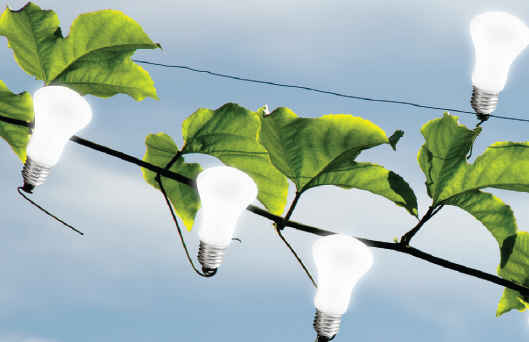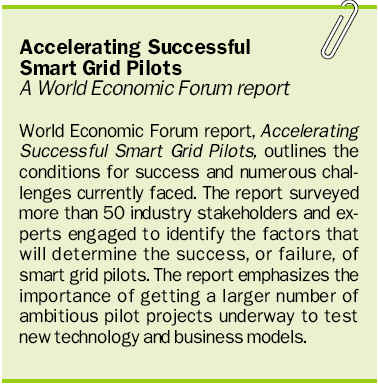By Roberto Bocca

Smarter Electricity Systems
.jpg) It is no surprise that today’s world is facing a true energy dilemma: how do we deliver secure, affordable, low-carbon energy to everyone? It is widely agreed that energy conservation and renewable energy are critical to securing our energy future, but smarter electricity systems--smart grids--are imperative to tap the full potential of modern energy solutions. It is no surprise that today’s world is facing a true energy dilemma: how do we deliver secure, affordable, low-carbon energy to everyone? It is widely agreed that energy conservation and renewable energy are critical to securing our energy future, but smarter electricity systems--smart grids--are imperative to tap the full potential of modern energy solutions.
A smart grid is an intelligent, digitized electricity system that provides an energy network which delivers electricity in an optimal way from source to consumption, enabling better energy management, minimizing power disruptions and transporting only the required amount of power.
Just as the current grid facilitated the industrial innovations of the 20th century, smart grids could substantially support clean energy growth and innovation in the 21st century.
Smart Grid and Clean Energy
What a smart grid does better is maximize the contribution of clean energy and new energy solutions such as wind, solar power and electric cars. Today’s grid was not built to handle large and increasing amounts of renewable energy production and send it from remote places to where electricity is consumed. Without a smart grid system, it would be virtually impossible for electric vehicles to work on a large scale. A smart and modernized grid is, therefore, the missing link for the use of clean energy to be within everyone’s grasp.
Energy Service Innovation
A smart grid can also serve as a platform for innovation in energy services, which gives customers more information about their energy footprint and ways to manage their electricity consumption. There is a carbon emission reduction potential, directly through more optimal production and transmission of electricity, and indirectly through influencing consumer behavior.
Strategic Moves by Government and Industry
 We are witnessing a trend of government stimulation and industry focus on smart grids and low-carbon technologies as a cornerstone for future industrial strategy. Last year, China alone spent over US$7 billion on smart grid developments focused on transmission and distribution--with a vision of building a ‘strong smart grid’ by 2020. The U.S. has directed US$4.5 billion of its fiscal stimulus package to smart grid activities. In Europe, Japan and South Korea, significant initiatives are currently underway. Recent studies, such as the European Climate Foundation 2050 Roadmap, highlight the importance of upgrading the electricity systems to achieve a low-carbon Europe. Innovative cities are spearheading ‘intelligent city’ concepts, whereby some smart grid capabilities are applied. Major industry players from across the electric utility, ICT and energy technology sectors are also developing smart grid strategies. We are witnessing a trend of government stimulation and industry focus on smart grids and low-carbon technologies as a cornerstone for future industrial strategy. Last year, China alone spent over US$7 billion on smart grid developments focused on transmission and distribution--with a vision of building a ‘strong smart grid’ by 2020. The U.S. has directed US$4.5 billion of its fiscal stimulus package to smart grid activities. In Europe, Japan and South Korea, significant initiatives are currently underway. Recent studies, such as the European Climate Foundation 2050 Roadmap, highlight the importance of upgrading the electricity systems to achieve a low-carbon Europe. Innovative cities are spearheading ‘intelligent city’ concepts, whereby some smart grid capabilities are applied. Major industry players from across the electric utility, ICT and energy technology sectors are also developing smart grid strategies.
Will Smart Grids Succeed?
With all this, what are the chances that smart grids will succeed? The investment and time required to deploy smart grids is significant and cannot be underestimated. For them to succeed, government, regulators and industry players must work together to create the conditions for success by supporting pilot projects and revisiting regulation to ensure alignment with policy priorities.
Most of the regulatory frameworks that currently exist were created during the period preceding the emergence of the low-carbon agenda, with the focus on a low-cost and reliable service. Although many aspects of the regulatory frameworks are still valid, some actively discourage the changes that are needed to transition the electricity systems towards a smart grid. To make a smart grid a sound investment for electric utilities and other companies, the business case in many countries must be strengthened--regulation will be the key. Also, there are important issues around setting standards for technology and tackling data security that must be addressed and will determine whether or not smart grids will be a success. Globally, we are at a critical point where clean energy will play a prominent role. Electricity systems will need to be flexible to allow for the incorporation of new low-carbon technologies, and customers will want more visibility and control of their energy consumption. Smart grids will play an important role in making electricity go smart, but the journey will be long and challenging. By acting now, decision-makers can increase the chances of success and avoid having the electricity infrastructure become a bottleneck to delivering a low-carbon, efficient and secure energy future.
Roberto Bocca is Senior Director and Head of Energy Industries at the World Economic Forum (www.weforum.org). Before joining the Forum, Roberto was a group leader in BP where he had a 14-year career in Downstream and Alternative Energy. As Director of the Emerging Consumer Markets for BP Alternative Energy, between September 2004 and January 2009, Roberto has led the development of an innovative business to provide access to cleaner, safer and affordable energy solutions to a large number of emerging consumers across the developing world. Roberto has worked extensively with international and local NGOs and academic institutions.
For more information, please send your e-mails to pved@infothe.com.
ⓒ2010 www.interpv.net All rights reserved.
|



